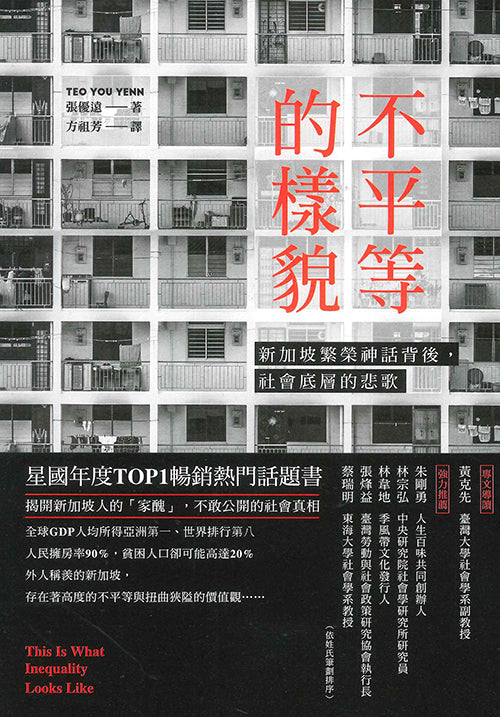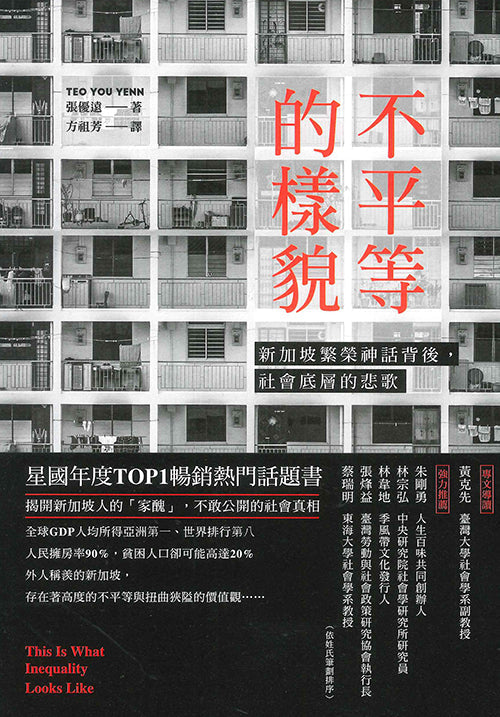The Face of Inequality: Behind Singapore's Prosperity, the Tragedy of the Underprivileged
The Face of Inequality: Behind Singapore's Prosperity, the Tragedy of the Underprivileged
1 in stock
Couldn't load pickup availability
出版社: 联经
ISBN/EAN: 9789570861464
出版日期: 2022-01-06
页数: 272页
语言: Traditional Chinese
Singapore's top-selling book of the year reveals Singaporeans' dirty laundry and the truths they dare not reveal.
The country ranks first in Asia and eighth in the world in terms of per capita GDP. With a 90% home ownership rate, the number of people living in poverty may be as high as 20%.
Singapore, admired by outsiders,
There is a high degree of inequality and distorted and narrow values...
On the highly developed island of Singapore,
There is a group of low-income people living in rental flats.
They may have a place to stay, but they can't find a place to stand...
Singapore seems to have been late in recognizing the problem of uneven distribution of income and wealth.
Because it’s hard for us to incorporate these realities into the story of progress and prosperity. — Zhang Youyuan
Taiwan’s housing prices remain high. Are you envious of Singapore’s “home ownership” policy?
In fact, many locals want to move out of their rental flats...
Singapore, one of the four Asian Tigers, has always given people the impression of being glamorous and prosperous. However, as one of the richest countries in Asia, its economic development is fraught with controversy. Its nationalism, which emphasizes national glory, only wants to highlight its strengths and avoid its weaknesses, and turns a blind eye to social inequality.
Sociology expert Zhang Youyuan visited the lower classes of society in depth, spending three years chatting, interviewing and observing low-income people to understand the difficulties faced by the vulnerable groups. Combining his ten years of professional research on Singapore's family, social welfare, gender and public policies, he pointed out the widespread problems and inequalities in Singapore's childcare structure, welfare system, education system and working environment, and reflected on ways to improve them.
The book's English edition went viral in Singapore, sparking a widespread and profound public debate on inequality, with far-reaching consequences. The issues exposed in the book are also evident in major Asian cities, where the middle class is growing and urban poverty is becoming increasingly severe. "The Face of Inequality" spans across classes, cities, countries, and regions, uncovering the pervasive inequalities beneath the surface, connecting people and reminding us to care about and value the dignity of every individual.
Teo You Yenn
A PhD in Sociology from the University of California at Berkeley, she is currently an Associate Professor and Chair of the Department of Sociology at Nanyang Technological University, Singapore. She has published numerous journal articles, books, and reviews, including Neoliberal Morality in Singapore: How Family Policies Make State and Society (Routledge, 2011). She is dedicated to teaching and bringing her research into the public domain. In 2013, she received the Nanyang Education Award and in 2016, the American Sociological Association's Sex and Gender Section's Feminist Scholar Activist Award.
Fang Zufang
Winner of the Jury Prize in Translation for the 23rd and 28th Liang Shiqiu Literary Awards. His translations include From New Manager to Top Manager, The New Korean, Design for a Lifetime, Creative Power Company, The Psychology of Consumer Behavior, Monkey Show on Wall Street, Flying Boys, and Taking the Right Next Step.
Foreword: A Classic Example of Public Sociology; Original Preface by Huang Kexian; Ethnography of Inequality; Preface by Guo Jianwen; Chapter 1: The First Step: Destroying the Existing Narrative; Chapter 2: Daily Life; Chapter 3: Balancing Work and Life Should Not Be a Class Privilege; Chapter 4: I Hope My Children Are Better Than Me; Chapter 5: Growing Up Without Class Protection; Chapter 6: Differential Deserves; Chapter 7: Needs, Wants, and Dignity; Chapter 8: Dignity is Like Clean Air; Chapter 9: Airing Family Dilemma in Public; Chapter 10: Memorandum on "Race"; Chapter 11: What Next?
Appendix Research Methods for All Readers: This is What the Data Looks Like Postscript Autoethnography: An Unexpected Year Acknowledgements References
Share


